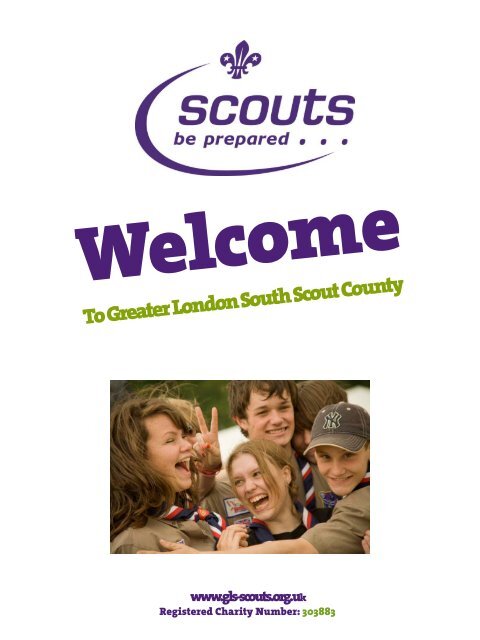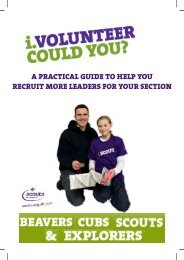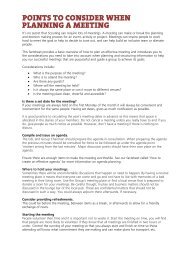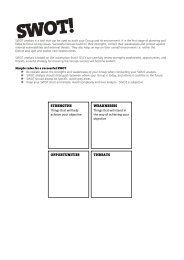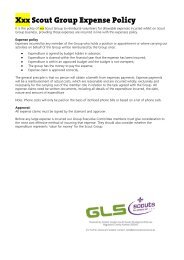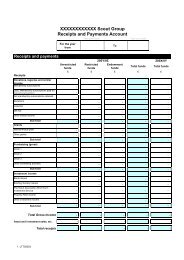www.gls-scouts.org.uk
www.gls-scouts.org.uk
www.gls-scouts.org.uk
You also want an ePaper? Increase the reach of your titles
YUMPU automatically turns print PDFs into web optimized ePapers that Google loves.
<strong>www</strong>.<strong>gls</strong>-<strong>scouts</strong>.<strong>org</strong>.<strong>uk</strong><br />
Registered Charity Number: 303883
…THE WORLD’S LARGEST YOUTH MOVEMENT<br />
Scouting is an international Movement with over 28 million<br />
members worldwide, spread across 216 countries and<br />
territories. The number of countries recognising the values<br />
of Scouting and accepting it’s principles is increasing and<br />
there are only four countries in the world who do not offer<br />
Scouting to young people.<br />
…WITH 500,000 MEMBERS IN THE U.K.<br />
In total there are about 500,000 members throughout the<br />
United Kingdom. This includes about 100,000 adults who<br />
have taken up appointments as voluntary leaders,<br />
administrators and supporters.<br />
…BOYS AND GIRLS FROM ALL FAITHS &<br />
BACKGROUNDS<br />
The Scout Association in the UK accepts Members of all<br />
faiths and offers equal opportunities for both boys and girls<br />
no matter what their social, religious or ethnic background<br />
may be.<br />
During 1991, girls were admitted to the Beaver Scout, Cub<br />
Scout and Scout sections. This complemented the<br />
admission of young women to the Venture Scout section in<br />
1976.<br />
During the Spring of 2002, the Scout Association launched<br />
a new programme for young people aged 6-25. This was<br />
the largest change to the activities we offer for nearly 40<br />
years.<br />
Two new sections were created to replace Venture<br />
Scouting: Explorer Scouts (14-18) and the Scout Network<br />
(18-25). This coincided with a complete re-brand of the<br />
Scout Association.<br />
…PROVIDING FUN, CHALLENGE & ADVENTURE<br />
WITH A CLEAR PURPOSE<br />
Scouting in the UK is <strong>org</strong>anised through the Scout<br />
Association. The Association has a clear purpose:<br />
“To help young people achieve their full physical,<br />
intellectual, social and spiritual potential, as individuals, as<br />
responsible citizens and as members of their local,<br />
national and international communities.”<br />
Even if we can’t solve all the problems in the world, we can<br />
help make it a better place. We do this by helping young<br />
people to develop as active members of their community<br />
who show:<br />
• Self-reliance<br />
• Care<br />
• Responsibility<br />
• Commitment<br />
…LEARNING BY DOING – FROM 6 TO 25<br />
Scouting works well when young people enjoy ‘learning by<br />
doing’ alongside adults - taking part in activities and new<br />
experiences, exploring the outdoors, participating in teams<br />
and taking responsibility.<br />
Our method for giving young people the opportunity to<br />
‘learn by doing’ is called the Programme. The Programme<br />
is a seamless progression of training, activities and<br />
awards that cover everything that young people should do<br />
in Scouting from the ages of 6 to 25.<br />
…AND KEPT SAFE BY OUR VOLUNTEER LEADERS<br />
All adults in Scouting have a responsibility to make sure<br />
that the programme is exciting and fun. We must also<br />
make sure it is safe. The Scout Association’s policies,<br />
rules, code of behaviour, advice on Child Protection and<br />
safety are there to help adults make sure that the young<br />
people in their care stay safe while they enjoy themselves<br />
and learn.<br />
…FOLLOWING THE SCOUT PROMISE<br />
Scouting has a simple and positive Promise that all<br />
Members are required to make. The Promise, together<br />
with the Scout Law, gives a distinctive ethos to the<br />
practices of the Movement and acts as a bond with Scouts<br />
in other countries. The key principles are:<br />
• Duty to self<br />
• Duty to God (or similar dependant on faith)<br />
• Duty to others<br />
Everyone in Scouting expresses their Membership and<br />
acceptance of the three key principles by taking the Scout<br />
Promise and following the Scout Law. Beaver Scouts and<br />
Cub Scouts have their own version of the Promise and<br />
Law, which is relevant for their age.<br />
… AND ORGANISED TO SUCCEED<br />
Scouting in the UK is<br />
operated locally in<br />
10,000 Scout Groups.<br />
Between 5 and 20<br />
groups in an area<br />
make up a ‘District’<br />
which may have<br />
it’s own Explorer<br />
Scout Unit(s).<br />
Scout Counties are<br />
groupings of Districts.<br />
EXPLORER<br />
SCOUT<br />
UNIT<br />
Greater London South Scouts. Registered Charity Number: 303883<br />
SCOUT<br />
DISTRICT<br />
(1,000)<br />
BEAVER<br />
SCOUT<br />
COLONY<br />
SCOUT<br />
GROUP<br />
(10,000)<br />
CUB<br />
SCOUT<br />
PACK<br />
SCOUT<br />
COUNTY<br />
(114)<br />
SCOUT<br />
TROOP
…BEAVERS SCOUTS (5+3/4 – 8 yrs)<br />
Beaver Scouts are young people<br />
usually aged between six and<br />
eight years old. They belong<br />
to the first and youngest<br />
Section in the Scouting<br />
family. Young people can join<br />
Beaver Scouts in the three months<br />
leading up to their sixth birthday. They can move to the<br />
next Section, Cub Scouts, between eight and eight<br />
years, six months.<br />
Easily recognised by their distinctive turquoise<br />
sweatshirts, Beaver Scouts enjoy making friends,<br />
playing games, going on visits and helping others. They<br />
usually meet together once a week in a Beaver Scout<br />
Colony. Some Beaver Scout Colonies also <strong>org</strong>anise<br />
Sleepovers. These are often the first time a young<br />
person spends a night away from home. They take<br />
place in suitable buildings, often Scout centres.<br />
…SCOUTS (10+1/2 – 14 yrs)<br />
The Scout Section is for<br />
young people, usually<br />
aged between 10 and<br />
14 years. A young person<br />
can come in to the Troop at 10 and may stay until they<br />
are 15 years old. The Scout Troop is the third and final<br />
Section in the Scout Group.<br />
Scouts are encouraged to take part in a wide range of<br />
activities as part of their programme. "Participation"<br />
rather than meeting set standards is the key approach<br />
and for the Scout who wants to be recognised for his or<br />
her achievements there are a number of Challenge<br />
Awards and Activity Badges. Scouts take part in a<br />
balanced programme that helps them to find out about<br />
the world in which they live, encourages them to know<br />
their own abilities and the importance of keeping fit and<br />
helps develop their creative talents. It also provides<br />
opportunities to explore their own values and personal<br />
attitudes.<br />
…CUB SCOUTS (8 – 10+1/2 yrs)<br />
There are loads of fun<br />
things to do as a Cub<br />
Scout. Cubs get<br />
a chance to try lots of<br />
different activities like<br />
swimming, music, exploring, computing and collecting.<br />
If they do them properly they will get a badge which they<br />
can wear on their uniform. Cub Scouts also get to go on<br />
trips and days out, to places like the zoo, theme parks or<br />
a farm. Sometimes they will be able to go camping with<br />
the rest of their Pack. This means they sleep in a tent<br />
and do loads of outdoor activities.<br />
YOU CAN FIND OUT MORE ABOUT SCOUTING AT:<br />
WWW.SCOUTS.ORG.UK<br />
…EXPLORER SCOUTS (14 – 18 yrs)<br />
Explorer Scouts are young people,<br />
usually aged between 14 and<br />
18 years old. They make<br />
up the fourth Section of the<br />
Scouting family. There are<br />
many types of Explorer<br />
Scout Units, some may be<br />
linked to a local Scout Group,<br />
others may be based around different activities.<br />
Not all Units meet each week, because it’s members<br />
will often be out and about at weekends or in the<br />
holidays doing activities. There will be times when<br />
young people will be busy doing other things such as<br />
exams, and being an Explorer Scout will have to fit<br />
around these. As an Explorer Scout, a young person<br />
will get the chance to work with other Explorer Scouts in<br />
their District, not just their Unit. By doing this, they get<br />
the chance to do many more activities, not just the ones<br />
their Unit <strong>org</strong>anises.<br />
Greater London South Scouts. Registered Charity Number: 303883
…Who are we?<br />
Greater London South Scout County is responsible for the<br />
growth and development of Scouting in the London<br />
Boroughs of Greenwich, Lewisham, Southwark, Lambeth<br />
and Wandsworth. It is made up of over 100 Scout groups<br />
spread across 10 districts.<br />
Scouting in the UK is operated locally in 10,000 Scout<br />
Groups. Between 5 and 20 groups in an area make up a<br />
‘District’ which may have it’s own Explorer Scout Unit(s).<br />
Scout Counties are groupings of Districts.<br />
…What can I do?<br />
There are a number of ways to get involved in Scouting.<br />
Many people assume that all adults must wear the uniform<br />
and run weekly meetings. In fact, there is a range of<br />
volunteer roles:<br />
SCOUT NETWORK<br />
YOUR PERSONAL DEVELOPMENT<br />
• Youth Section for those aged 18-25<br />
• Socialise, try new activities and have a great time!<br />
• Achieve your Queen’s Scout Award, D<strong>uk</strong>e of Edinburgh<br />
or Explorer Belt<br />
<strong>scouts</strong>.<strong>org</strong>.<strong>uk</strong>/network<br />
SCOUT ACTIVE SUPPORT<br />
ACTIVE SUPPORT<br />
• Support Scouting in a flexible way that suits you<br />
• Work with a like-minded group of people<br />
• Make use of your skills<br />
• Get involved in a variety of ways<br />
<strong>scouts</strong>.<strong>org</strong>.<strong>uk</strong>/activesupport<br />
…What do we do?<br />
Everyday of the week adult volunteers offer challenge and<br />
adventure to over 5,000 young people, boys and girls,<br />
aged 6-25. Nearly 1,000 adults volunteer their time to<br />
allow these young people to take risks in a safe<br />
environment, and have their first taste of responsibility.<br />
We give young people experiences they’ll never f<strong>org</strong>et.<br />
…Why volunteer?<br />
With award winning training<br />
and one-to-one support, we<br />
make sure that each one of<br />
our volunteers gets to make<br />
the best use of their skills and<br />
talents. It’s something different<br />
from the norm, and that why a<br />
lot of people like it. Besides all<br />
the support, it is a great way to<br />
make friends, meet new<br />
people and above all enjoy<br />
yourself.<br />
In fact, it’s what’s made us the largest co-educational<br />
youth Movement in the country.<br />
SECTION LEADER<br />
GIVE SOMETHING BACK<br />
• Work with young people regularly<br />
• Directly contribute towards their personal development<br />
• Get training and support relevant to your role<br />
• Can be exhausting but rewarding!<br />
ADULT SUPPORTER<br />
PROVIDE VITAL SUPPORT<br />
• Support the adults in Scouting,<br />
enabling them to work with young<br />
people<br />
• Variety of roles available to suit<br />
different people<br />
• Receive training and support<br />
relevant to you role<br />
IF YOU ARE INTERESTED IN JOINING US, VISIT:<br />
WWW.SCOUTS.ORG.UK/JOIN<br />
OR CALL 0845 300 1818<br />
Greater London South Scouts. Registered Charity Number: 303883
…Career prospects<br />
Volunteering gives you the opportunity to test out<br />
potential career choices, helping you to find a job you<br />
enjoy. And the experiences you gain are invaluable<br />
when applying for jobs, proving both your interest in a<br />
particular career path and your success at it.<br />
…Developing new skills<br />
Volunteering improve your employability by developing<br />
your skills. By volunteering, you can learn how to<br />
communicate better with people and work as part of a<br />
team to achieve your goal. These are all things that help<br />
to make your CV look more interesting when applying<br />
for jobs.<br />
By volunteering, you can also show employers that you<br />
have an interest in improving both your community and<br />
yourself beyond academic study. Employers are<br />
increasingly seeking ‘well-rounded’ individuals, i.e.<br />
people who can show more than just academic<br />
achievement. Volunteering helps you to develop skills<br />
and attributes you do not necessarily use in a<br />
classroom. These include planning, leadership,<br />
motivation and self-management.<br />
…Gaining qualifications<br />
Volunteering can lead to all manner of qualifications,<br />
both formal and informal. Scouting offers training for<br />
volunteers, both internally and as part of a nationally<br />
recognised qualification. Such training and<br />
qualifications provide volunteers with transferable skills<br />
that can improve their performance at work or whilst<br />
studying, and add further to your CV.<br />
…Building self confidence<br />
Many volunteers encounter a variety of new challenges<br />
when they begin giving time in their communities.<br />
Sharing new experiences with new people, they can<br />
learn new skills that can give them confidence to face<br />
challenges in other areas of their lives.<br />
…It’s a good thing<br />
Volunteering gives you the chance to help other people<br />
to achieve their goals and succeed in what they want to<br />
do. Helping others in this way can lead to greater selfesteem<br />
and encourage you to face and overcome new<br />
and bigger challenges.<br />
…Give something back<br />
Many people recognise that there are a wide range of<br />
community <strong>org</strong>anisations helping young people, and<br />
indeed many people have benefited from their work.<br />
They understand that young people get a lot out of the<br />
activities provided by volunteers, and want to give<br />
something back to their community in the same way.<br />
…Making friends<br />
Volunteering is a great way to meet people with similar<br />
interests and to simply have fun. Working with young<br />
people involves a variety of activities, and can be a<br />
chance for a volunteer to rediscover adventure for<br />
themselves, whilst making new friends and having fun.<br />
Greater London South Scouts. Registered Charity Number: 303883<br />
IF YOU ARE INTERESTED IN JOINING US, VISIT:<br />
WWW.SCOUTS.ORG.UK/JOIN<br />
OR CALL 0845 300 1818
Jargon busting<br />
Like most big <strong>org</strong>anisations, Scouting uses a lot of abbreviations and has its own names for different<br />
things.<br />
Below is a quick reference guide to some of the key ones. Abbreviations are shown in brackets next to<br />
the term.<br />
Baden-Powell (B-P)<br />
Activity badges<br />
Lord Robert Baden Powell, the Founder of the Scout<br />
Specialist optional badges in the first four Sections<br />
Movement.<br />
that extend a young person’s interest of skills.<br />
Assistant Beaver Scout Leader (ABSL)<br />
An adult appointed to assist the leader of the Beaver<br />
Scout colony.<br />
Assistant County Commissioner (ACC)<br />
An adult who works in a Scout County to support<br />
other adults at District or Scout Group level. They will<br />
normally focus on a specific area e.g. Cub Scouts,<br />
Activities, Adult Training.<br />
Assistant Cub Scout Leader (ACSL)<br />
An adult appointed to assist the leader of the Cub<br />
Scout pack.<br />
Assistant District Commissioner (ADC)<br />
An adult who works in a Scout District to support<br />
other adults at Scout Group level. They will normally<br />
focus on a specific area e.g. Cub Scouts, Activities,<br />
Adult Training.<br />
Assistant Explorer Scout Leader (AESL)<br />
An adult appointed to assist the leader of the<br />
Explorer Scout unit.<br />
Assistant Scout Leader (ASL)<br />
An adult appointed to assist the leader of the Scout<br />
troop.<br />
Associate member<br />
An adult who wishes to join Scouting, but not take the<br />
Promise. Associate Members cannot hold Leader or<br />
Commissioner appointments.<br />
Award Scheme<br />
The system of badges, certificates and awards the<br />
recognises young people’s achievements. It also<br />
recognises their participation in the Programme.<br />
Balanced Programme<br />
The Balanced Programme is one that provides young<br />
people with a wide range of activities drawn from<br />
each of the Programme Zones through a variety of<br />
methods.<br />
Beaver Scout<br />
An invested Member of the Movement aged between<br />
5 3/4 and 8 1/2 years of age.<br />
Beaver Scout Colony (Colony)<br />
The name given to the grouping of Beavers Scouts<br />
who meet as a Section.<br />
Beaver Scout Leader (BL)<br />
An adult appointed to run a Beaver Scout Colony.<br />
Chief Scout<br />
The Chief Scout leads Scouting in the UK, and is<br />
supported by the Chief Commissioner of the UK. The<br />
current Chief Scout is Bear Grylls.<br />
Commissioner<br />
An adult appointed to provide support to other adults<br />
either in a support or managerial role.<br />
County<br />
A geographical area which provides support to Scout<br />
Districts and Groups.<br />
County Commissioner (CC)<br />
A person appointed to lead, promote and maintain<br />
policies of the Movement.<br />
County Executive Committee<br />
A committee that supports the work of the County<br />
Commissioner.<br />
Greater London South Scouts. Registered Charity Number: 303883
County Scout Network Commissioner (CSNC)<br />
The person appointed by the County Commissioner<br />
to lead the provision of Scout Network in the County.<br />
Cub Scout<br />
An invested Member of the Movement aged between<br />
8 and 10 1/2 years of age.<br />
Cub Scout Leader (CSL)<br />
An adult appointed to run the Cub Scout Pack.<br />
Cub Scout Pack (Pack)<br />
The collective name for Cub Scouts meeting together<br />
as a Section.<br />
District<br />
A collection of Scout Groups within an identifiable<br />
boundary, led by a District Commissioner.<br />
District Commissioner (DC)<br />
A person appointed by the County Commissioner to<br />
lead a Scout District and support the work of Scout<br />
Groups.<br />
District Chairman<br />
Person who leads the administrative support to a<br />
Scout District.<br />
District Executive Committee<br />
The committee that supports the work of the District<br />
Commissioner in the administration and running of a<br />
Scout District.<br />
District Explorer Scout Commissioner (DESC)<br />
The person responsible to a District Commissioner<br />
for the management of Explorer Scouting in the<br />
District.<br />
Explorer Scout<br />
An invested Member of the Movement aged between<br />
14 and 18 years of age.<br />
Explorer Scout Leader (ESL)<br />
An adult appointed to run the Explorer Scout Unit.<br />
Explorer Scout Unit (ESU)<br />
The collective name for Explorer Scouts meeting<br />
together as a Section.<br />
Gilwell Park (Gilwell)<br />
The UK National HQ, National Training Centre and<br />
Campsite of The Scout Association.<br />
Group Chairman<br />
The person nominated annually by the Group Scout<br />
Leader who chairs the Group Executive Committee<br />
and Group Council.<br />
Group Scout Leader (GSL)<br />
The adult appointed by the Scout District responsible<br />
for leadership and management of a Scout Group.<br />
Group Secretary<br />
An adult who provides administrative support to a<br />
Scout Group and its Executive Committee.<br />
Group Treasurer<br />
An adult who maintains the financial records of a<br />
Scout Group.<br />
Helper<br />
An adult who holds a certificate of appointment who<br />
helps with a Section, but does not hold a Leader<br />
appointment.<br />
Investiture<br />
The ceremony at which a Member takes the Promise<br />
when they join the Movement or move Sections.<br />
Law, Scout<br />
The code which all Members of the Movement follow.<br />
Leader<br />
An adult who leads and manages a Section.<br />
Line Manager<br />
The person to whom an adult is responsible, and who<br />
provides guidance and support.<br />
Membership Award<br />
The award given to all Members upon their<br />
investiture into a Section.<br />
Policy, Organisation and Rules (POR)<br />
This publication contains the policies and rules of The<br />
Scout Association.<br />
Greater London South Scouts. Registered Charity Number: 303883
Programme<br />
The term used to describe the entire programme<br />
experience, including awards, badges and method of<br />
operating the programme for young people aged 6-25<br />
years.<br />
Programme Zone<br />
The areas of activities on which each Section bases<br />
its Balanced Programme.<br />
Promise<br />
A public statement each Member makes upon<br />
Investiture and on other occasions. It states that they<br />
will do their best to follow the principles and values of<br />
Scouting.<br />
Scarf<br />
Coloured neckerchief worn by Members. The scarves<br />
clearly identify Members with a particular Scout<br />
Group, District or County.<br />
Scout<br />
An invested Member of the Movement normally aged<br />
between 10 1/2 and 14 years old. This is also a generic<br />
term used to describe any Member of the Scout<br />
Movement.<br />
Scout Active Support<br />
The new name for the Scout Fellowship. Individuals<br />
aged 18 or over who work together to provide active<br />
support to Scouting in the local community.<br />
Scout Fellowship<br />
Individuals aged 18 or over who work together to<br />
provide active support to Scouting in the local<br />
community.<br />
Scout Group<br />
A number of Sections in the same local community<br />
form a Scout Group.<br />
Scout Information Centre<br />
Located at UK HQ at Gilwell Park, it is a one-stop<br />
shop for information, resources and merchandise.<br />
Call 0845 300 1818 or info.centre@scout.<strong>org</strong>.<strong>uk</strong>.<br />
Scout Network Member<br />
All Members of The Scout Association aged between<br />
18-25 can be registered as a part of a Scout Network.<br />
They can participate in the Programme and also have<br />
Leadership or support roles.<br />
Scout Leader (SL)<br />
The adult appointed to run a Scout Troop.<br />
Scout Troop (Troop)<br />
The collective name for Scouts meeting together as a<br />
Section.<br />
Section<br />
A unit in a Scout Group or District – Beaver Scouts,<br />
Cub Scouts, Scouts, Explorer Scouts and the Scout<br />
Network.<br />
Skills Instructor<br />
People given a certificate of appointment. They are<br />
normally appointed to instruct young people on<br />
specific skills, such as canoeing or first aid.<br />
Warrant<br />
The certificate of appointment awarded to new<br />
Leaders, Commissioners, Assistant Leaders and<br />
Assistant Commissioners on their appointment.<br />
Wood Badge<br />
Awarded to an adult on completion of their core adult<br />
training.<br />
Woggle<br />
Device used to hold up a scarf, worn around the<br />
neck.<br />
World Membership Badge<br />
The badge worn by many Scouts which tells people<br />
that they belong to the world-wide Movement. This is<br />
normally given to a Member at their Investiture.<br />
Yellow Card<br />
A small card which contains The Scout Assocation’s<br />
child protection policy. All adults working in<br />
Scouting must have a copy.<br />
Scout Network<br />
This is a County co-ordinated network for Members<br />
aged 18-25 years of age.<br />
Young Leader<br />
An Explorer Scout who works as part of<br />
the leadership team in a younger Section.<br />
Greater London South Scouts. Registered Charity Number: 303883


